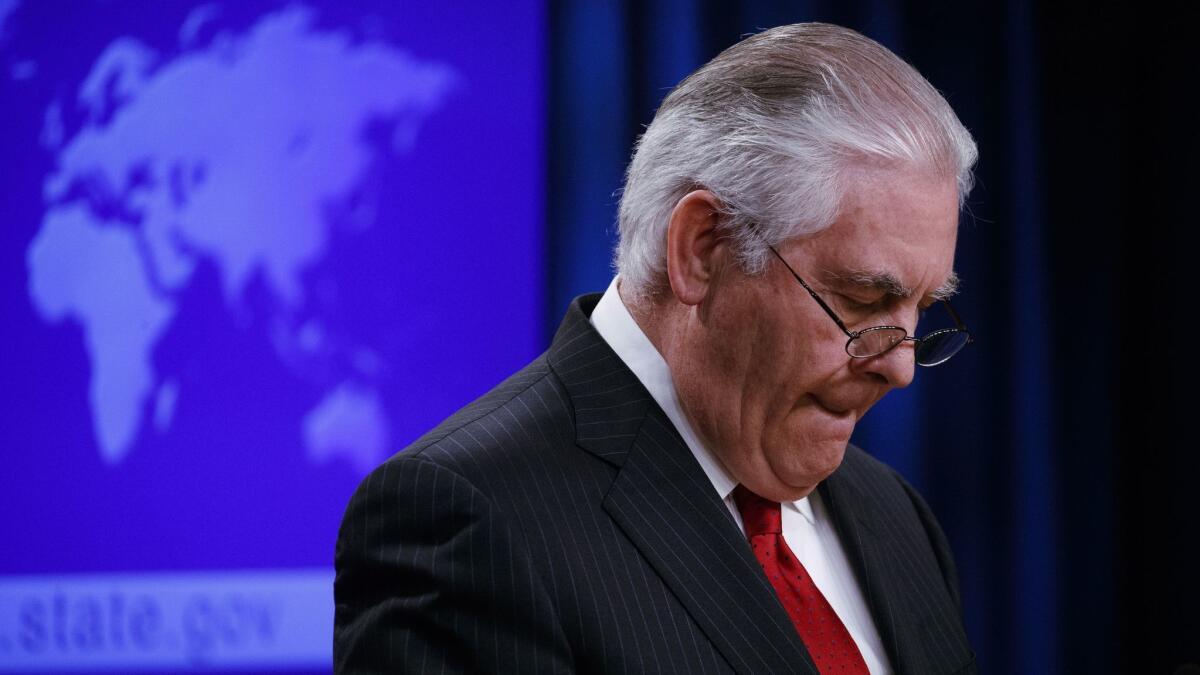Op-Ed: Rex Tillerson neutered the State Department. Don’t mourn his firing

- Share via
The unceremonious sacking of Secretary of State Rex Tillerson via Twitter was the latest gut punch to the battered State Department. For hundreds of U.S. foreign service officers who had just spent weeks organizing Tillerson’s “We Don’t Think You Are All Shitholes” tour of Africa, it was yet another face-palm moment.
I recently served nearly two years as a diplomat with the U.S. Mission to Somalia and previously served in South Sudan, Poland and Washington. I understand well the crucial role these high-level diplomatic visits play in building relationships and sending clear messages about America’s priorities. But all the long hours and late nights required, in this case, were for naught. As Tillerson wound up humiliated and jobless, our African partners realized they had wasted their time with a has-been and reconfirmed that President Trump doesn’t care about Africa.
Afterward, some pundits and liberal politicians mourned Tillerson’s departure because he was one of the few remaining “adults in the room” in the Trump administration. I believe, however, that the State Department is better off without a chief who championed neither the institution nor successful American diplomacy.
If Pompeo does something to repair the neutered State Department, he could turn out to be an unexpected champion for a reenergized civilian foreign policy.
I resigned from the State Department in December, part of the mass exodus during Tillerson’s 13-month tenure, because I no longer believed the department was able to promote American values and interests overseas. Our work had become futile, and our inability to influence military decision-making was potentially dangerous. Tillerson didn’t have the ear of Trump, and we didn’t have the ear of Tillerson.
The department lost 60% of its career ambassadors last year. These nonpartisan top diplomatic professionals either were pushed out or chose to leave, having been sidelined by an administration that dismissed their expertise.
Tillerson also cut hiring to below attrition rates, slashed promotion numbers, championed a 30% budget cut and left empty dozens of critical leadership positions. He completely eliminated the office in charge of developing, implementing and coordinating foreign policy-related sanctions, an essential tool that allows us to apply pressure short of military force.
During the course of 2017, I watched our influence and leadership in Somalia recede, not from a desk in Washington, but right in front of me during meetings in Mogadishu. In my role with the U.S. Mission, I sought to promote a more peaceful and democratic Somalia in our national security interest. But my Somali counterparts started to ask, “Does your government really care about our stability?”
Foreign partners patiently listened to our proposals but no longer solicited our advice. We couldn’t assure them that the U.S. position today would be our position tomorrow. We had no idea ourselves. We no longer could be reliable partners.
As I watched Tillerson push for staffing cuts, I recalled my time in South Sudan in 2013, clocking in 80 to 90 hours a week with two full-time jobs — consular officer and political officer — in an unstable country collapsing into civil war. Like so many of my colleagues, I chose to live in difficult and dangerous places because I believed in America’s role in the world. We were on the front lines to enhance security, promote democratic values and provide emergency assistance, to make the world — and thus America — a safer and better place. Under Tillerson, such sacrifices seemed to serve no end.
I hold no illusions that Mike Pompeo, whom President Trump is shuffling over to State from the CIA, will champion our democratic values any more than Tillerson did. Pompeo has defended mass domestic surveillance, the CIA’s condemned torture program of the Bush years and a prison in Guantanamo that feeds our enemies’ narratives. He holds hawkish positions on North Korea and Iran.
I have faith, however, in our career diplomats. If Pompeo does something to repair the neutered State Department, he could turn out to be an unexpected champion for a reenergized civilian foreign policy.
Pompeo could start by filling key leadership roles that Tillerson left vacant. We currently have no ambassador to South Korea, Saudi Arabia, Turkey or the European Union. Dozens of other pivotal posts remain empty. Pompeo also should insist that the State Department take the lead in our global engagements. This means, for example, ending policy meetings with heads of state for Jared Kushner without diplomats present, and not leaving it to Ivanka Trump to negotiate our way out of potential nuclear war with North Korea.
And if Pompeo wants to be a more effective secretary of State than Tillerson was, he might even open himself up to input from seasoned diplomats. If we’re really lucky, he’ll come to understand the role that human rights and democracy — traditionally bipartisan values — play in creating a more stable world. I won’t hold my breath on that. At this point, I’d settle for filling critical senior positions, and it’d be a bonus if those hired actually knew what they were doing.
Elizabeth Shackelford was a foreign service officer with the State Department in Poland, Washington, South Sudan and Somalia.
Follow the Opinion section on Twitter @latimesopinionand Facebook
More to Read
A cure for the common opinion
Get thought-provoking perspectives with our weekly newsletter.
You may occasionally receive promotional content from the Los Angeles Times.






